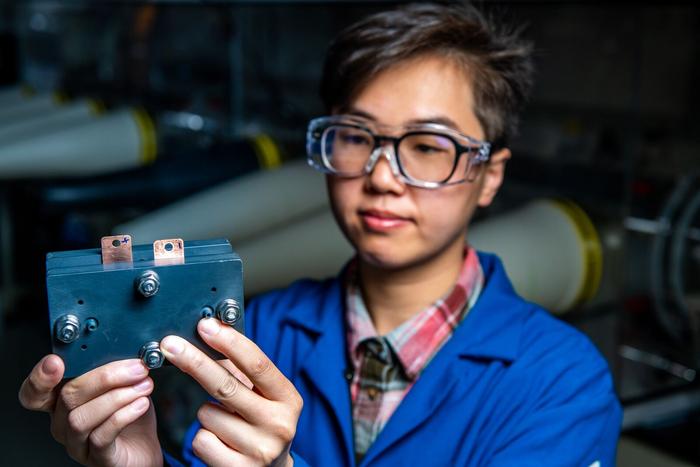
Researchers at the Pacific Northwest National Laboratory (PNNL), a renowned facility operated by the U.S. Department of Energy, have unveiled an innovative approach to energy storage that could dramatically accelerate the development of new flow battery technologies. This breakthrough comes as part of a larger effort to enhance energy storage systems that are crucial for integrating renewable energy sources into the grid effectively. The team’s approach employs a miniaturized flow battery design, requiring significantly less starting material, while achieving performance metrics comparable to standard lab-scale flow battery systems.
The traditional flow battery architecture, which has garnered attention for its utility in storing energy generated by intermittent renewable sources, typically comprises large-scale systems. Flow batteries offer the advantages of flexible energy scaling and the ability to discharge energy on-demand, making them an attractive option for grid applications. However, their large size and high material costs have historically posed significant barriers to rapid innovation. The recent miniaturization effort by PNNL researchers aims to overcome these hurdles and streamline the testing of new battery materials.
In a published article in the Journal of The Electrochemical Society, the team describes a newly developed compact flow battery test system. This system scales down the traditional flow battery design by a factor of five, creating a mini flow cell that mimics the internal architecture of its larger counterpart while significantly reducing the amount of precursor materials needed for research. With only milligrams of material required for testing, researchers can now quickly determine the viability of new compositions which could lead to enhanced energy storage solutions.
Researchers have pointed out that the miniaturized flow cell design is a pivotal innovation. According to Ruozhu Feng, a lead author of the study and a renowned flow battery scientist at PNNL, this research marks the initial phase toward integrating artificial intelligence and robotics to further automate and accelerate the testing process for flow battery designs. Doing so could potentially revolutionize the scope of energy storage research, allowing for the rapid validation of a broader spectrum of experimental chemistries.
Importantly, the mini flow cell design doesn’t compromise on performance. The test system has shown that rigorous validation of the material’s stability can be accomplished despite its compact size. This model has been tailored specifically for research laboratories eager to conduct rapid screening of new battery materials, streamlining the workflows involved in materials discovery and testing. However, it is crucial that the starting materials used are of high purity to avoid any obstruction in the system’s narrow channels.
In pursuit of protecting their intellectual property, the PNNL research team is applying for U.S. patent coverage for the mini flow cell design. This strategic move is part of PNNL’s overarching goal of facilitating collaboration and technology licensing, inviting partnership with other research entities and commercial players interested in this cutting-edge energy storage technology. With their established framework for innovation, the lab hopes that the advancements will lead to commercially viable solutions for energy storage applications.
The strength of this research endeavor is underscored by the collective expertise of the team, which includes engineers and chemists whose diverse skills converge in designing effective energy storage solutions. Soowhan Kim, a lead researcher and designer of the mini flow cell, emphasized that their collaborative experience encompasses over a decade of work in various aspects of flow battery design. As cells evolve from small to large, it is vital to maintain accuracy and reliability without needing excessive amounts of chemical materials on hand.
Flow batteries are particularly attractive because they utilize liquid electrolytes that can be stored in external tanks, allowing for flexible scaling regarding energy capacity. This characteristic makes them well-suited for large-scale energy storage challenges, such as integrating wind and solar energy into utility grids. However, the search for new chemical combinations that can optimize efficiency, reduce costs, and ensure the sustainable sourcing of materials is vital to enhancing the viability of flow battery systems.
Historically, the discovery of new flow battery materials has been a painstaking process, often characterized by labor-intensive trial-and-error frameworks requiring considerable time and substantial material quantities. With the introduction of a miniaturized testing apparatus, the paradigm is shifting. The new design, comparable in size to a playing card, minimizes the material usage to just a few grains of sand, enabling a drastic reduction in both time and resources committed to testing phases, all while still delivering robust results.
As momentum builds around the energy storage research being pursued by PNNL, collaboration extends beyond the lab. With the backing of the Energy Storage Research Alliance, a consortium comprised of leading experts from national laboratories and academic institutions, there is a shared vision to propel advancements in battery technology that will define future energy systems. Researchers engaged in the initiative are optimistic that the momentum gained from this innovative work will inspire further developments in the field of energy storage.
In conclusion, the PNNL team’s pioneering work in miniaturizing flow batteries signifies a critical turning point in energy storage technology. By enhancing the speed at which new materials can be validated and reducing the required raw materials, this innovation has the potential to fuel the next wave of breakthroughs in renewable energy systems. With continuous advancements in this space, the future of energy storage looks bright and promising, paving the way for solutions that will address many of the pressing energy challenges faced today.
Subject of Research: Energy storage technologies, flow batteries.
Article Title: Miniaturize the Redox Flow Battery for Accelerated Materials Discovery and Development.
News Publication Date: 26-Dec-2024.
Web References: Journal of The Electrochemical Society, PNNL, Energy Storage Research Alliance.
References: DOI: 10.1149/1945-7111/ad9bef.
Image Credits: Credit: Andrea Starr | Pacific Northwest National Laboratory.
Keywords
Energy Storage, Flow Batteries, Materials Discovery, Automation, Renewable Energy, Pacific Northwest National Laboratory.
Tags: compact flow battery systemsenergy storage advancementsenergy storage research breakthroughsenergy storage system efficiencyflow battery innovationgrid energy applicationslab-scale battery performancemini flow battery technologyPacific Northwest National Laboratoryrenewable energy integrationrenewable energy sources storagescalable battery design





